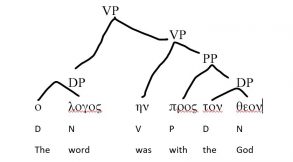In 1 Peter there are 10 present imperatives and 25 aorist imperatives. As discussed elsewhere, and in general agreement with others, the aorist is a general unspecified aspect.
In ΒΓΤΕ, the present imperative is described as “sharper command and are less courteous.”
Consider how some Koine grammars describe the present imperative: “μή with the present imperative forbids the continuance of the action;” (BGGNT 408). This analysis directly agrees with mine.
I suggest that treating the present indicative verb as “viewed as ongoing” is the best starting point for analysis. This means that the author assumes that the readers are doing something that needs to be stopped or doing something that needs to be continued. With this analysis one would translate the Greek present imperative as “keep on doing …” or “stop doing.” These translations would be different from a generic imperfective which might be translated as “continually be doing . . .”
As to the present imperative being, “sharper command and are less courteous,” this could be congruent with “viewed as ongoing at time of command.” To say “stop doing this,” or “keep on doing that” is much more “sharp” or direct than saying generally “do this” or “don’t do that.”
The starting point of “viewed as ongoing,” does not necessarily mean that the author has knowledge about the recipients, but could be assuming their action. Thus, one might say “stop doing what you shouldn’t be doing,” or “keep on doing what you should be doing.” Thus, Peter might be exhorting the readers based on a hypothetical state of affairs. This analysis is a discourse topic and is probably best analyzed through the cognitive linguistic theory of mental spaces. But back to the author’s choice of aspect, Peter would have directly chosen to use the present imperative rather than the aorist imperative for Peter’s communicative purpose.
With this theory, the 10 present imperatives of 1 Peter would be translated as follows:
2:17 Keep on loving
2:17 keep on fearing
2:17 keep on honoring
3:3 this is the verb “to be” and does not have a choice between aoristic and imperfective
4:12 stop being surprised
4:13 keep on rejoicing
4:15 stop suffering as a murderer, thief, a criminal or mischief maker
4:16 stop considering it a disgrace to suffer as a Christian
4:16 keep on glorifying God
4:19 keep on entrusting your soul to a faithful creator
The theory that the present imperative assumes ongoing action yields the above translations. This would also result in the observation that Peter, the author assumed the following about this readers: They were actively loving the family of believers, fearing God, and honoring the emperor. These believers were rejoicing in God but were surprised and even disgraced at their suffering, even though some were suffering for their own errors. In spite of this, they were glorifying God and entrusting themselves to God.
In conclusion, the theory that the present imperative addresses ongoing action makes sense in these verses. This theory also works for the present imperative in other verses in the NT, and in Modern Greek. On a larger scale, this theory is congruent with how aspect works in other languages as well.#GreekBible#KoineGreek#VerbalAspect#1Peter#New Testament Greek
Views: 293
